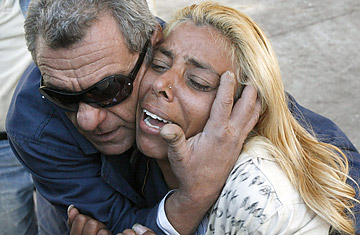
An Israeli man comforts a woman near the scene of an explosion in the southern city of Eilat, January 29, 2007. Palestinian militant groups carried out their first suicide bombing in Israel in nine months, killing 3 people.
By then, it was too late. A local Israeli noticed the Arab youth walking into a bakery. "I saw a man with a black coat and a bag," Benny Mazgini told Israeli radio. "For Eilat, where it is hot, it is strange to see someone walking with a coat. I said to myself, 'Why is this idiot dressed that way?' "
His answer came seconds later. A huge explosion blew a hole in a bakery, sending body parts and bread showering onto the pavement outside. Three Israelis were killed and two others wounded by the blast. Responsibility for the terror attack was immediately claimed by three different Palestinian militant groups, one of them — Islamic Jihad — identifying the bomber as Mohammed Siksik, 21, from Gaza.
Amid the ongoing bloodletting among Palestinians in Gaza — nearly 30 have been killed since fighting erupted last Thursday between gunmen of Hamas and Fatah — Israelis could be forgiven for thinking that Palestinians were too distracted to launch attacks on Israel. But the bakery attack was a grotesque reminder that some Palestinian groups still have Israel locked in their sights — and the authors of bombing may even have hoped to send a message to Hamas and Fatah, locked in a murderous power struggle, not to lose sight of their principal foe.
A masked fighter of Islamic Jihad appeared on Palestinian television following the attack and read a statement announcing that the attack was intended as "a clear message to Palestinians that we must stop our internal fighting and aim our weapons at the Israeli occupation forces." Other Palestinians say this is a power play aimed at winning popular support for Islamic Jihad by showing that is the only group still fighting Israel.
Palestinian organizations claimed that Siksik had slipped over the border from Jordan, but an Israeli intelligence official told TIME that Siksik was tracked coming across from Egypt. These sources said the bomber had left Gaza and crossed through the Sinai desert mountains, picking up his suicide vest from cohorts along the way, and then cut across the frontier, probably guided by Bedouin smugglers, not far from where he was picked up hitch-hiking by the Israeli reservist.
The Eilat bombing was the first suicide attack inside Israel in 10 months. Palestinians say this lull had been a result of Hamas, previously the main backers of suicide bombers, declaring a truce. However, Israeli intelligence claims that plenty of bombers are still trying to sneak over from the Palestinian territories, but that the long security fence and checkpoints along the roads have prevented more attacks.
Israel's government now faces a dilemma: Should it retaliate for the Eilat bombing and risk uniting the warring Palestinian factions against the traditional common foe; or should it sit back and continue to watch Hamas and Fatah shoot each other in a growing civil war? The men who sent the bomber appear to have been betting on retaliation
— With reporting by Jamil Hamad/Bethlehem and Aaron J. Klein/Jerusalem
